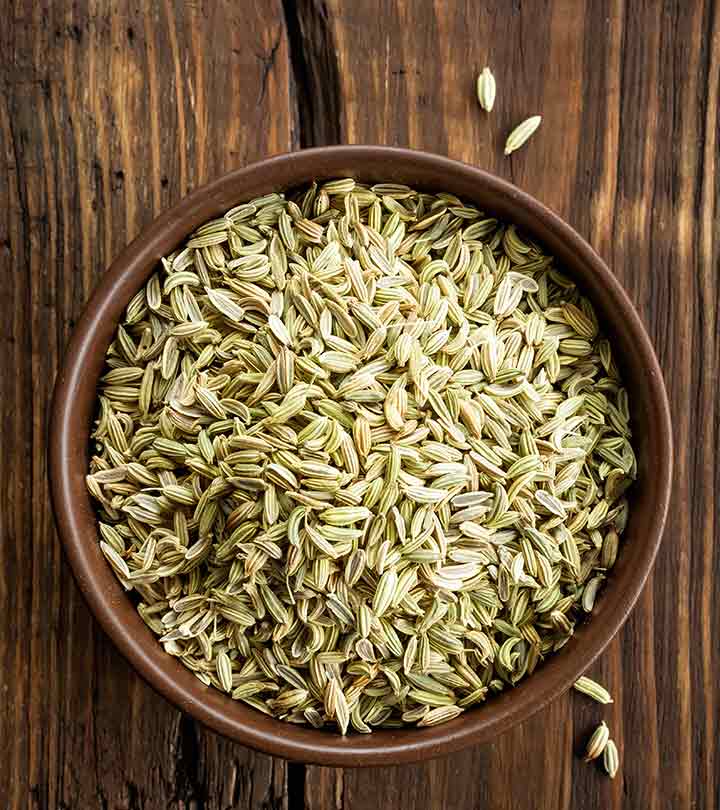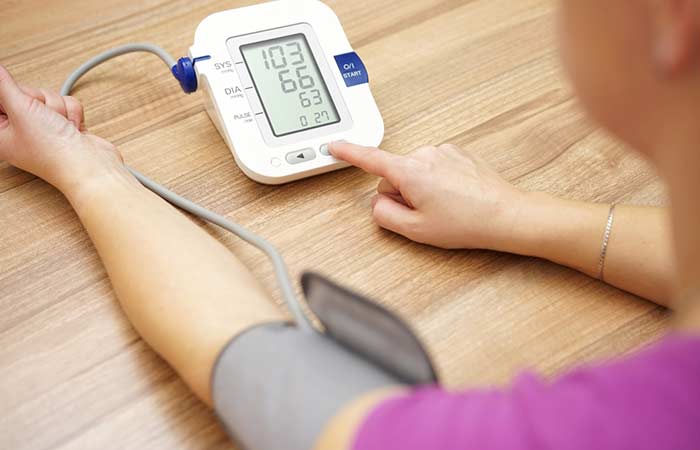19 Amazing Benefits Of Fennel Seeds For Skin, Hair, And Health
Fennel seeds are considered quite useful for relieving various ailments, ranging from congestion and stomach gas to asthma and diabetes. The seeds contain powerful phytonutrients and antioxidants, the most potent of them being anethole, which makes them highly nutritious and powerful. Also called semillas de hinojo in Spanish, graines de fenouil in French, and budhur alfianal in Arabic, the seeds are too beneficial to ignore. Keep reading to know more.
What Are The Benefits of Fennel Seeds?
1. Improve Digestive Health
The seeds are often used to treat an array of digestive ailments, including heartburn, intestinal gas (and infant gas), bloating, and even colic in infants. The seeds have antispasmodic and carminative effects, which can help treat other serious digestive ailments like irritable bowel syndrome (1).
Though there is less information, some sources suggest that fennel seeds might also help treat gastroesophageal reflux disease (GERD), diarrhea, constipation, and ulcerative colitis.
2. Treat Asthma And Other Respiratory Ailments
The phytonutrients in fennel seeds help clear sinuses – and this can relieve asthma symptoms. And their expectorant properties heal other respiratory ailments like bronchitis, cough, and congestion.
However, some studies suggest that fennel seeds might cause asthmatic symptoms. We recommend you talk to your doctor in this regard.
3. Benefit Breastfeeding Women
Shutterstock
Fennel seeds contain a compound called anethole, which is a phytoestrogen that mimics the properties of the estrogen hormone and increases milk secretion in women. This is particularly helpful for lactating women.
Talking about pregnancy, we don’t have enough information to suggest if fennel seeds can be helpful during this period.
4. Combat Bad Breath
Chewing fennel seeds can freshen your breath. They have anise (or licorice) flavor. Simply munching on 5 to 10 fennel seeds freshens your breath. The seeds increase the production of saliva – thereby washing out the bacteria. The essential oil has antibacterial properties that help fight the germs that cause bad breath.
The longer you chew the seeds, the more refreshing they are.
[ Read: Home Remedies For Bad Breath ]
5. Help Fight Diabetes
A 2008 study found that fennel essential oil might lower blood sugar levels in diabetics. Fennel seeds are also a good source of vitamin C, the high intake of which was also found to lower blood sugar levels. Beta-carotene, another antioxidant in fennel seeds, has also been linked to reduced cholesterol levels in patients with type 2 diabetes.
Also, since fennel seeds are low in glycemic index, they can be a good addition to a diabetes diet.
6. Increase Breast Growth
We have already seen that fennel can mimic the properties of human estrogen, which is why it can promote breast growth. However, due to limited information, we suggest you talk to your doctor before using fennel seeds for this purpose.
7. Help Lower Cholesterol Levels
The fiber in fennel seeds prevents the reabsorption of cholesterol. It achieves this by binding the bile salts, which consequently prevents heart-related ailments.
8. Cure Edema
Edema is the swelling of tissues in the body due to excess of fluid. Though there are no concrete studies, anecdotal evidence supports the efficacy of fennel seeds in curing edema. Anethole, one important compound in fennel seeds, can control blood pressure and flush out the excess water from the body. In addition, the seeds also improve kidney function, ultimately helping in flushing out toxins.
[ Read: Effective Home Remedies For Edema ]
9. Boost Fertility
This might be true with fennel tea. Given its estrogenic properties, it might promote fertility and even induce labor in pregnant women.
However, there is lack of concrete research. We advise you to consult your doctor before using fennel for this purpose.
10. Regulate Blood Pressure Levels
Shutterstock
One reason fennel seeds work wonders on blood pressure levels is their potassium levels. This mineral counteracts the ill effects of sodium and regulates the fluid amount in the bloodstream.
The seeds are also rich in calcium, another mineral imperative for optimum blood pressure. It helps keep the blood vessels toned – and even helps maintain heart rate. And the fiber in fennel seeds has also shown to regulate blood pressure levels.
Fennel seeds also contain nitrites (in fact, the highest amongst other seeds), compounds known to lower blood pressure levels. They are also rich in magnesium, which, as per some studies, can cut the risk of high blood pressure in women (2).
11. Aid Hernia Treatment
Some sources mention the use of fennel seeds by traditional Chinese medicine for treating hernia (3). However, we need more research to confirm if they can be used in mainstream hernia treatment.
12. Enhance Liver Health
In one 2011 study, fennel seeds inhibited liver cancer cells and increased the activity of certain antioxidant cells in the liver. Fennel seeds are rich in selenium, which improves the function of the liver enzymes and detoxifies some harmful compounds in the body.
Some sources suggest that fennel seeds might even help relieve urinary tract infection – but we need more research on this.
13. Can Promote Weight Loss
Being rich in fiber, fennel seeds can aid weight loss and keep hunger pangs at bay. The seeds also are said to decrease fat storage as they improve nutrient absorption.
Also, fennel seeds have diuretic properties. They increase urine output and flush out the excess fluid from the body (we already saw this). This also might contribute to weight loss. But there is something to be kept in mind – most often, the weight loss induced by fennel could be a direct consequence of water loss, and not fat loss.
One Korean study proved that intake of fennel tea could suppress appetite in overweight people (4).
[ Read: How To Lose Weight Fast At Home ]
14. Ease Morning Sickness
Fennel seeds can be used to calm the stomach and offer quick relief from morning sickness. Chewing fennel seeds or having fennel tea can help achieve this.
Fennel seeds also prevent stomach gas and encourage the expulsion of gas. This can help treat nausea, especially if it is caused due to digestive issues like flatulence or intestinal gas.
15. Improve Menstrual Symptoms
Preliminary studies have confirmed that fennel is safe and effective for easing menopause symptoms. Other studies have also confirmed the effectiveness of fennel in treating postmenopausal symptoms (5).
Interestingly, the phytoestrogenic properties of fennel seeds can also help treat menstrual symptoms like cramps and hot flashes (6).
16. Enhance Sleep Quality
Shutterstock
Some sources suggest that the magnesium in fennel seeds can improve the quality and duration of sleep. The mineral also treats sleep disorders like insomnia.
17. Treat Candida
The antioxidants in fennel seeds can help treat candida. The seeds also possess antibacterial and antifungal properties – and can hence be effective against E.coli and Candida albicans, both of which cause candida.
In fact, fermented fennel seeds are far more powerful than the unfermented ones – when it comes to offering antifungal benefits. Taking a tablespoon of fennel seeds along with breakfast can help ease the symptoms. You can crush them and add to your breakfast. You can also consume fennel tea by steeping the seeds in hot water and taking the infused tea in the morning.
18. Tone And Improve Skin Appearance
We already spoke about the antimicrobial properties of fennel seeds – which also make them a wonderful remedy for skin problems.
For toning your skin, you can take a handful of fennel seeds and add them to boiling water. Allowed it to cool down. Then, add a few drops of fennel essential oil to the mixture. Filter it. Dab it on your face with the help of cotton balls as many times as you can throughout the day. Your skin will feel toned and thoroughly refreshed.
You can also use fennel seed steam facial for enhanced skin texture. Add a tablespoon of fennel seeds to one liter of boiling water. Lean over it and cover your head and neck with a towel for 5 minutes. Do this twice a week to clean the pores and make your skin glow.
You can also use a face mask, which is quite easy to prepare. Prepare a fennel seed infusion by adding a tablespoon of fennel seeds to half a cup of boiling water. Wait for 30 minutes and add a tablespoon each of oatmeal and honey to it. Make a smooth paste and apply it to your face. Leave it on for 20 minutes. Wash off with lukewarm water.
19. Improve Hair Health
The antioxidants and other antimicrobial properties in fennel seeds help treat a host of hair ailments. Some of these include dandruff, scalp itchiness, hair breakage, and hair fall. There are two ways you can use fennel seeds for boosting hair health.
One is fennel seed tea. You can pound three tablespoons of fennel seeds. Alternately, you may choose to invest in readymade fennel seed powder. Boil two cups of water and add it to the powdered seeds. Keep the solution aside for about 15 minutes. Use it as the last rinse after you have shampooed and conditioned your hair. This will boost hair health and prevent hair breakage and hair fall.
The other way is using a fennel seed-vinegar solution. You can use apple cider vinegar and glycerin along with fennel seeds to prepare a solution to treat an itchy and dry scalp. Boil a cup of water. Pour it over a spoon of crushed fennel seeds placed in a small bowl. Wait for 30 minutes. Add a spoon of vegetable glycerin and apple cider vinegar. Filter the solution with a cheesecloth. Massage it into your scalp and hair and leave it on for some time. Rinse it off. The best part is that this tonic can be stored in a glass container for weeks.
That’s with the list of benefits of fennel seeds. All of this wouldn’t be possible without the powerful nutrients in the seeds. Which is what we will look at now.
What Are The Nutrients In Fennel Seeds?
Nutrition FactsServing Size 87g | |||||
Amounts Per Selected Serving | |||||
Calories 27 | Calories from Fat 1 | ||||
| % Daily Value | |||||
| Total Fat | 0 g | 0% | |||
| Cholesterol | 0 mg | 0% | |||
| Sodium | 45 mg | 2% | |||
| Total Carbohydrate | 6 g | 2% | |||
| Dietary Fibre | 3 g | 11% | |||
| Protein | 1 g | ||||
Vitamins | |||||
Amounts Per Selected Serving | %DV | ||||
| Vitamin A | 117 IU | 2% | |||
Vitamin C | 10.4 mg | 17% | |||
Vitamin D | ~ | ~ | |||
Vitamin E (Alpha Tocopherol) | ~ | ~ | |||
Vitamin K | ~ | ~ | |||
| Thiamin | 0.0 mg | 1% | |||
| Riboflavin | 0.0 mg | 2% | |||
| Niacin | 0.6 mg | 3% | |||
| Vitamin B6 | 0.0 mg | 2% | |||
| Folate | 23.5 mcg | 6% | |||
| Vitamin B12 | 0.0 mcg | 0% | |||
| Pantothenic Acid | 0.2 mg | 2% | |||
| Choline | ~ | ||||
| Betaine | ~ | ||||
Minerals | |||||
Amounts Per Selected Serving | %DV | ||||
| Calcium | 42.6 mg | 4% | |||
| Iron | 0.6 mg | 4% | |||
| Magnesium | 14.8 mg | 4% | |||
| Phosphorus | 43.5 mg | 4% | |||
| Potassium | 360 mg | 10% | |||
| Sodium | 45.2 mg | 2% | |||
| Zinc | 2.5 mg | 1% | |||
| Copper | 0.2 mg | 3% | |||
| Manganese | 0.1 mg | 8% | |||
| Selenium | 0.6 mcg | 1% | |||
| Fluoride | ~ | ||||
Conclusion
Though research is lacking in some aspects, overall, fennel seeds can give a boost to your health. Include them in your routine, and you will see the difference.
And tell us how this post has made your life better. Simply leave a comment below.
Expert’s Answers For Readers’ Questions
How much fennel can I consume in a day?
Five to seven grams of fennel seeds or 0.1 mL to 0.6 mL of the oil would do.
What can I substitute fennel seeds with?
Anise seeds can be a good substitute as they also have a licorice flavor. And since anise seeds have a stronger flavor, you can use them in small amounts.
Which part of fennel can we use?
The white fennel bulb and the green fronds are usually used. Fennel stalks are quite tough and generally not consumed.
References
- “Curcumin and fennel essential oil…”. US National Library of Medicine.
- “Magnesium”. University of Maryland Medical Center.
- “Fennel”. Purdue University.
- “Fennel…”. US National Library of Medicine.
- “Study confirms benefits of fennel…”. ScienceDirect.
Discover more from ReviewFitHealth.com
Subscribe to get the latest posts sent to your email.




